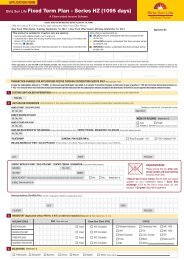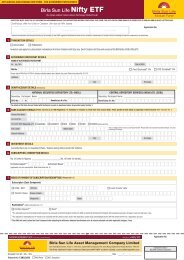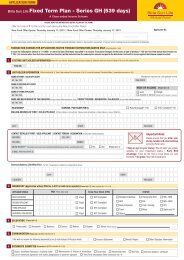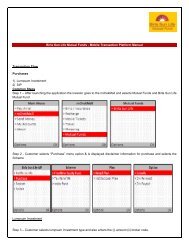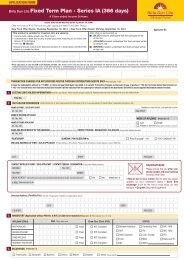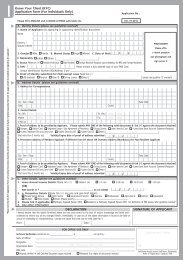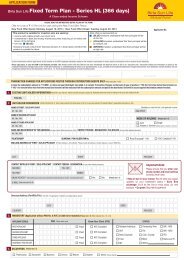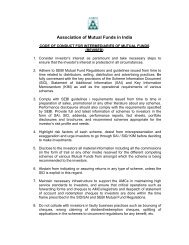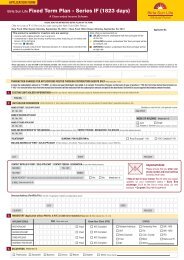Connect for the Month of February 2009 - Birla Sun Life Mutual Fund
Connect for the Month of February 2009 - Birla Sun Life Mutual Fund
Connect for the Month of February 2009 - Birla Sun Life Mutual Fund
Create successful ePaper yourself
Turn your PDF publications into a flip-book with our unique Google optimized e-Paper software.
F e b r u a r y 2 0 0 9<br />
Market Outlook<br />
Equity Market<br />
Indian equity markets started <strong>the</strong> year positive on <strong>the</strong> central government's second fiscal<br />
stimulus package. The RBI also chipped in through monetary stimulus that helped <strong>the</strong><br />
market earlier in <strong>the</strong> month. However, <strong>the</strong> effect was nullified by <strong>the</strong> shock <strong>the</strong> markets<br />
received from <strong>the</strong> Satyam scam after <strong>the</strong> initial euphoria. The absence <strong>of</strong> ano<strong>the</strong>r round <strong>of</strong><br />
rate cuts in <strong>the</strong> RBI policy review also did not help <strong>the</strong> already damp sentiment. BSE<br />
Sensex ended with a loss <strong>of</strong> 223.07 points or 2.31% to end <strong>the</strong> month at 9424. The sectors<br />
that were hit <strong>the</strong> most included Real Estate that melted 26.65% followed by Bankex, which<br />
fell 10.17%. Among <strong>the</strong> gainers, Oil & Gas was up 3.35% and Auto was up 2.27%,<br />
supported by <strong>the</strong> cut in <strong>the</strong> motor fuel prices that raised anticipation <strong>of</strong> higher demand.<br />
Power stocks gained after <strong>the</strong> Central Electricity Regulatory Commission (CERC) upped<br />
return on equity on power companies to 15.5% from <strong>the</strong> existing 14% - applicable on<br />
projects from <strong>2009</strong> to 2014.<br />
The Satyam financial fraud bodes ill <strong>for</strong> liquidity and specifically <strong>for</strong> sentiment. Focused<br />
investors are likely to scrutinize corporate governance, disclosures, composition <strong>of</strong><br />
boards; use <strong>of</strong> cash proceeds etc. & stay invested or switch into perceived high quality<br />
companies.<br />
We believe that <strong>the</strong> long term consumption/ urbanization <strong>the</strong>me as India is less dependent<br />
on global growth than o<strong>the</strong>r Asian economies. Though, some impact on domestic<br />
consumption is inevitable, India is in much better shape with high <strong>for</strong>ex reserves and much<br />
lower consumer gearing. It is important to acknowledge that business cycles and asset<br />
markets tend to overshoot and undershoot, and some <strong>of</strong> <strong>the</strong> recent slowdown in economic<br />
activity, which only a short time ago seemed highly improbable – now might have a chance<br />
<strong>of</strong> transpiring. However, going <strong>for</strong>ward we are keenly watching certain key developments<br />
which are likely to impact course <strong>of</strong> markets.<br />
On global front, confidence was fur<strong>the</strong>r shaken when Chinese exports, after growing by<br />
more than 20 percent a year over <strong>the</strong> last few years and being seen as a key growth<br />
engine, reported collapse in growth. It is believed that <strong>the</strong> Chinese <strong>the</strong> economy is highly<br />
dependent on exports, where tens <strong>of</strong> millions <strong>of</strong> workers are employed. The millions <strong>of</strong> new<br />
migrant workers that flock to export factories every year have been driving <strong>the</strong> urban<br />
housing boom. Now with <strong>the</strong> export engine down, <strong>the</strong> scale <strong>of</strong> job losses from Chinese<br />
manufacturing sector would be unprecedented, causing social unrest.<br />
Global developments provide clear feedback to markets in terms <strong>of</strong> financial flows both into<br />
secondary market and capital financing (in primary debt and equity markets), in turn<br />
impacting underlying economic activity. It would also be crucial to monitor how <strong>the</strong> current<br />
risk aversion trade reverses. In this context corporate bond spreads are vital. A sustained<br />
rally in equity markets is more likely to be led by falling corporate bond spreads than better<br />
economic data in <strong>the</strong> short-term. Recently, <strong>the</strong> Fed's action in <strong>the</strong> commercial paper market<br />
has dramatically reduced yields and spreads in that market in recent months. More<br />
recently, <strong>the</strong> BoJ and BoE have also hinted that <strong>the</strong>y may be willing to consider buying<br />
corporate debt which is likely to ultimately start to bring down spreads.<br />
On domestic front, upcoming general election could sway <strong>the</strong> markets ei<strong>the</strong>r way. The<br />
uncertainty and possibility <strong>of</strong> a large coalition government at <strong>the</strong> centre would create<br />
ambiguity over future policy actions and hence business sentiments.<br />
Corporate earnings scorecard <strong>for</strong> <strong>the</strong> December quarter was uninspiring on overall basis.<br />
The BSE500 members that reported results (total 322), non-banking companies registered<br />
a decline <strong>of</strong> 37% yoy while banks showed a 24% yoy increase <strong>for</strong> Banks in Net Pr<strong>of</strong>it.<br />
Overall sales growth stood at 4% yoy while EBITDA declined 20% yoy signaling a margin<br />
compression. On sectoral basis, Banks, Telecom and IT were <strong>the</strong> only positive surprises<br />
while on <strong>the</strong> flipside Capital Goods, Construction, Commodities and Real Estate showed<br />
poor numbers. As <strong>the</strong> current financial year comes to a close, after <strong>the</strong> fourth quarter, <strong>the</strong>re<br />
is a risk <strong>of</strong> fur<strong>the</strong>r downgrades to consensus earnings expectations <strong>for</strong> <strong>the</strong> coming fiscal.<br />
Although, while, much <strong>of</strong> <strong>the</strong> negatives are already in <strong>the</strong> current stock prices, in an<br />
economic environment like <strong>the</strong> current one, sentiments may overrule <strong>the</strong> underlying<br />
fundamentals. Then again, precisely such scenarios yield attractive opportunities.<br />
Our assessment <strong>of</strong> <strong>the</strong> opportunity present <strong>for</strong> <strong>the</strong> Indian economy remains unchanged. If<br />
and when right policy levers are used, it would not be difficult to match <strong>the</strong> potential ei<strong>the</strong>r.<br />
In <strong>the</strong> short term, though, <strong>the</strong> markets may behave in unpredictable ways as various<br />
participants weigh <strong>the</strong>ir tactical moves. As a strategy, we consider it prudent to gradually<br />
invest incrementally into equities through <strong>2009</strong> with a 3 to 5 years investment horizon.<br />
Corporate per<strong>for</strong>mance is likely to look up from <strong>the</strong> later part <strong>of</strong> <strong>the</strong> fiscal <strong>2009</strong>-10 and <strong>the</strong><br />
equity markets should bottom out some time be<strong>for</strong>e that.<br />
Debt Market<br />
Bond market<br />
The 10-year yield rose to as high as 6.18% during <strong>the</strong> month after making a historical intraday<br />
low <strong>of</strong> 4.86% at <strong>the</strong> start <strong>of</strong> <strong>the</strong> month. The 10 year yield on AAA corporate paper<br />
moved from 8% to a high <strong>of</strong> 9.15% during <strong>the</strong> month making it one <strong>of</strong> <strong>the</strong> most volatile<br />
month. Money market yields maintained a downward trend on back <strong>of</strong> easy liquidity with 1<br />
year CDs coming down from a high <strong>of</strong> 8.50% to making a low <strong>of</strong> 6.90%.<br />
Macro factors overall supported <strong>the</strong> debt market but bonds appeared to have hit a ceiling<br />
on concerns <strong>of</strong> overwhelming supply. Government is expected to come up with an<br />
additional borrowing requirement <strong>for</strong> FY09 which will flood <strong>the</strong> market and thus an upward<br />
pressure on <strong>the</strong> yields. The government on January 6th raised <strong>the</strong> borrowing target <strong>for</strong> <strong>the</strong><br />
fourth quarter to garner funds <strong>for</strong> meeting rising expenses.<br />
Exports dropped 1.1% yoy in December, a third consecutive drop as <strong>the</strong> global slowdown<br />
dampens demand. The trade deficit narrowed in December due to a sharp drop in <strong>the</strong> cost<br />
<strong>of</strong> oil imports. The industrial output rose 2.4% in November y-o-y, rebounding from <strong>the</strong><br />
previous month's revised decline <strong>of</strong> 0.3%. Fiscal deficit during April-December stood at<br />
2.18 trillion rupees, ($44.5 billion) or 163.8% <strong>of</strong> <strong>the</strong> annual target. The government has<br />
borrowed INR 2.15 Tr as against budgeted INR 1.45 Tr.<br />
Yields on government securities across <strong>the</strong> globe came <strong>of</strong>f from <strong>the</strong> lows reached during<br />
December despite macro factors being in support <strong>of</strong> <strong>the</strong> debt market. European bonds<br />
faced selling pressure with several European countries facing sovereign rating<br />
downgrades. Central banks still continue on rate cutting spree with BoE bringing down its<br />
policy rate to historical low. ECB, Australia, Bank <strong>of</strong> Korea and Taiwan also cut <strong>the</strong>ir policy<br />
rates. Fed maintained <strong>the</strong> target rate near zero and in addition announced <strong>the</strong> extension <strong>of</strong><br />
swap lines with various central banks across <strong>the</strong> globe and continuation <strong>of</strong> existing liquidity<br />
facilities in domestic markets. IMF has cut down <strong>the</strong> global growth <strong>for</strong>ecast to 0.5% from<br />
2.2%, <strong>the</strong> lowest ever since World War-II. The outlook remains bleak <strong>for</strong> <strong>the</strong> current year.<br />
On January 2, <strong>the</strong> RBI had cut <strong>the</strong> LAF rates by 100 bps and eased CRR by 50 bps,<br />
releasing Rs.20,000 crores into <strong>the</strong> system. Later in its Policy review meeting, Reserve<br />
Bank <strong>of</strong> India kept all its policy rates unchanged. Though, policy stance remains<br />
considerably dovish and paves way <strong>for</strong> fur<strong>the</strong>r monetary easing as and when required.<br />
RBI's stance on growth and inflation matches <strong>the</strong> market consensus as <strong>the</strong>y expect both<br />
<strong>the</strong> economic indicators to ease substantially. We expect RBI to ease fur<strong>the</strong>r over next few<br />
months as economic news gets gloomier. RBI acknowledges that non-banking financial<br />
resources <strong>for</strong> banking system have dried up causing increased demand <strong>for</strong> credit from <strong>the</strong><br />
banking system. This remains a key reason <strong>for</strong> elevated bond spreads. We expect <strong>the</strong><br />
credit growth to slow down considerably over next two quarters, easing pressure on<br />
banking system to industry's financing needs.<br />
We don't think that RBI is pausing in easing rates, and <strong>the</strong> current stance <strong>of</strong> 'hold' is only to<br />
accommodate <strong>the</strong> transmission <strong>of</strong> deep rate cuts RBI has orchestrated over last three<br />
months. Since RBI has extended <strong>the</strong> refinance window <strong>for</strong> MFs and NBFCs till September,<br />
it augurs well <strong>for</strong> fur<strong>the</strong>r easing in <strong>the</strong> money market rates. 10-year Gsec is trading at<br />
5.80/85 and is likely to take fresh cues from IIP, GDP, export-import data and unscheduled<br />
auction announcements in <strong>the</strong> coming weeks.<br />
Bond yields are likely to be choppy in <strong>the</strong> near-term owing to <strong>the</strong> prevailing uncertainty over<br />
additional government borrowing. Macro factors support bonds but those aspects have<br />
been fully factored in and bonds remain bogged down by short-term uncertainties. The<br />
vote-on-account to be held on 16th <strong>February</strong> is much awaited <strong>for</strong>. Current scenario<br />
remains a tug-<strong>of</strong>-war between unprecedented monetary easing and huge bond supply<br />
causing <strong>the</strong> volatility. We expect <strong>the</strong> markets will remain volatile till <strong>the</strong> issue <strong>of</strong> additional<br />
borrowing is resolved.<br />
Our Investment Team (In alphabetical order)<br />
A. Balasubramanian Chief Investment Officer<br />
Achala Kanitkar Research Analyst - Equity<br />
Ajay Argal<br />
Co - Head Equity<br />
Ajay Garg<br />
<strong>Fund</strong> Manager - Equity<br />
Ankit Sancheti <strong>Fund</strong> Manager - Equity<br />
Atul Penkar<br />
Hemang Dagli<br />
Hina Sampat<br />
Lokesh Mallya<br />
Mahesh Patil<br />
<strong>Fund</strong> Manager - Equity<br />
Sr. Dealer - Equity & Deri. Specialist<br />
Executive - Knowledge Management<br />
Credit Analyst-Fixed Income<br />
Co - Head Equity<br />
Maneesh Dangi<br />
Paresh Khandelwal<br />
Prasad Dhonde<br />
Sanjay Chawla<br />
Co - Head Fixed Income<br />
Equity Analyst<br />
<strong>Fund</strong> Manager - Debt<br />
<strong>Fund</strong> Manager - Equity<br />
Satyabrata Mohanty<br />
Sujit Patki<br />
<strong>Sun</strong>aina da Cunha<br />
Vineet Maloo<br />
Co - Head Fixed Income<br />
Dealer-Equity<br />
<strong>Fund</strong> Manager - Debt<br />
<strong>Fund</strong> Manager - Equity<br />
03



